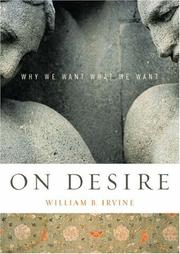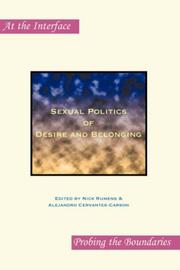| Listing 1 - 10 of 21 | << page >> |
Sort by
|
Book
ISBN: 9781628087024 1628087021 9781628087017 1628087013 Year: 2013 Publisher: Hauppauge New York
Abstract | Keywords | Export | Availability | Bookmark
 Loading...
Loading...Choose an application
- Reference Manager
- EndNote
- RefWorks (Direct export to RefWorks)
In this book, the authors discuss the psychology of cravings. Topics include craving theories from each of the following paradigms: phenomenological, psychobiological, cognitive, conditioning, psychodynamic and trans-theoretical approaches; control and acceptance as the dominant way of managing cravings; and understanding undergraduates' cravings and guilt for sweets and carbohydrates.

ISBN: 1280845910 0195345975 1429438088 9780195345971 9780195188622 0195188624 9780195327076 0195327071 9781280845918 9781429438087 0199839085 Year: 2007 Publisher: Oxford Oxford University Press
Abstract | Keywords | Export | Availability | Bookmark
 Loading...
Loading...Choose an application
- Reference Manager
- EndNote
- RefWorks (Direct export to RefWorks)
Presents a study of the phenomenon of desire: how it controls us, how we seek to control it; what wisdom has been offered on the subject by philosophy, religion and science over the ages. This book brings together a range of religious advice on mastering desire, from the Buddhist middle path to the promise of a Christian or Islamic afterlife.
Book
ISBN: 1281868264 9786611868260 0199717397 9780199717392 0195322851 9780195322859 0197729878 0190295791 Year: 2009 Publisher: New York : Oxford University Press,
Abstract | Keywords | Export | Availability | Bookmark
 Loading...
Loading...Choose an application
- Reference Manager
- EndNote
- RefWorks (Direct export to RefWorks)
Many people believe that pleasure and desire are obstacles to reasonable and intelligent behavior. This book reveals that what we desire, what pleases us, in fact, our most base, animalistic tendencies, are actually very important sources of information.
Book
ISBN: 0429481934 1282779605 9786612779602 1849408203 9781849408202 9781282779600 9781780493251 1780493258 9781855756106 1855756102 0429906706 9780429906701 9780429481932 6612779608 Year: 2009 Publisher: London Karnac
Abstract | Keywords | Export | Availability | Bookmark
 Loading...
Loading...Choose an application
- Reference Manager
- EndNote
- RefWorks (Direct export to RefWorks)
"The 'graph of desire' is one of the principal points of reference in Lacanian psychoanalysis. In this book the graph is analyzed in its multiple aspects and relations. Step by step, the author reveals and considers formulations from the simplest to the most complex. The treatment of this issue does not deal only with the development and explanation of its logical, mathematical and topological aspects but also goes through the psychoanalytical theory and practice. The author has immersed himself in Lacan's text "The Subversion of the Subject and the Dialectic of Desire in the Freudian Unconscious" to uncover and bring this fascinating subject to light."--Provided by publisher.
Desire. --- Psychoanalysis. --- Psychology --- Psychology, Pathological --- Appetency --- Craving --- Longing --- Yearning --- Emotions --- Lacan, Jacques, --- Lacan, Jacques
Book
ISBN: 9782889195176 Year: 2015 Publisher: Frontiers Media SA
Abstract | Keywords | Export | Availability | Bookmark
 Loading...
Loading...Choose an application
- Reference Manager
- EndNote
- RefWorks (Direct export to RefWorks)
Food cravings refer to an intense desire to consume specific foods and are predictive of over- or binge eating. Many studies have been performed in an attempt to assess, understand and control food cravings. The aim of this research topic is to present up-to-date information about food cravings from different perspectives.The expected themes are (but are not limited to):Assessment of food cravings.The role of food cravings in eating disorders, dieting, and obesity.Psychological mechanisms that underlie food cravings.Influence of food cravings on food choice.Relationship between food cravings and food addiction, wanting and liking.Self-control of food cravings.Interventions aimed at reducing food cravings.
Psychiatric Disorders, Individual --- Psychiatry --- Health & Biological Sciences --- Bulimia --- craving --- Obesity --- Body Weight --- Binge eating --- food addiction --- Food
Book
ISBN: 0804785937 0804785929 0804788898 9780804788892 9780804785921 9780804785938 Year: 2014 Publisher: Stanford, California
Abstract | Keywords | Export | Availability | Bookmark
 Loading...
Loading...Choose an application
- Reference Manager
- EndNote
- RefWorks (Direct export to RefWorks)
One thing all mainstream economists agree upon is that money has nothing whatsoever to do with desire. This strange blindness of the profession to what is otherwise considered to be a basic feature of economic life serves as the starting point for this provocative new theory of money. Through the works of Karl Marx, Thorstein Veblen, and Max Weber, What Money Wants argues that money is first and foremost an object of desire. In contrast to the common notion that money is but an ordinary object that people believe to be money, this book explores the theoretical consequences of the p
Consumption (Economics) -- Juvenile literature. --- Income -- Juvenile literature. --- Wages -- Juvenile literature. --- Wages. --- Money --- Desire --- Economics --- Finance --- Business & Economics --- Philosophy --- Economic aspects --- Philosophy. --- Economic aspects. --- Appetency --- Longing --- Emotions --- E-books --- Craving --- Yearning
Book
ISBN: 1472533518 1474219357 1472525744 9781474219358 9781472525741 9781472533517 9781472529138 1472529138 9781472529138 Year: 2016 Publisher: New York : Bloomsbury Academic,
Abstract | Keywords | Export | Availability | Bookmark
 Loading...
Loading...Choose an application
- Reference Manager
- EndNote
- RefWorks (Direct export to RefWorks)
"The indebtedness of contemporary thinkers to Derrida's project of deconstruction is unquestionable, whether as a source of inspiration or the grounds of critical antagonism. This collection considers: how best to recall deconstruction? Rather than reduce it to an object of historical importance or memory, these essays analyze its significance in terms of complex matrices of desire; provoked in this way, deconstruction cannot be dismissed as 'dead', nor unproblematically defended as alive and well. Repositioned on the threshold of life-death, deconstruction profoundly complicates the field of critical thought which still struggles to memorialize, inter, or reduce the deconstructive corpus to ashes."--Bloomsbury Publishing.
Deconstruction. --- Desire. --- Appetency --- Craving --- Longing --- Yearning --- Emotions --- Criticism --- Semiotics and literature --- Derrida, Jacques. --- Derrida, Jacques --- Derrida, J. --- Derida, Žak --- Derrida, Jackes --- Derrida, Zhak --- Deridah, Z'aḳ --- Deridā, Jāka --- Dirīdā, Jāk --- Деррида, Жак --- דרידה, ז'אק
Book
Year: 2021 Publisher: Basel, Switzerland MDPI - Multidisciplinary Digital Publishing Institute
Abstract | Keywords | Export | Availability | Bookmark
 Loading...
Loading...Choose an application
- Reference Manager
- EndNote
- RefWorks (Direct export to RefWorks)
Addiction in its various forms represents an enormous challenge to society. Worldwide, it has been estimated that alcohol, tobacco and illicit drugs were responsible of more than 10 million deaths (Anderson et al, 2018), with a higher impact in developed countries where substance use disorders have been identified as responsible for life expectancy reversals (Rehm et al, 2016). Societal and medical responses to the problem are far from optimal, but the appearance of new technologies offers room for improvement, and lots of new initiatives have been launched and developed. In this Special Issue, we will describe and discuss how these new tools are helping to improve the assessment and treatment of substance use disorders. We will cover a wide variety of novelties that are being applied to addiction; e-health, APPs, digital phenotyping, ecological momentary assessment and interventions, wearable technology, computer-assisted tests, transcraneal magnetic stimulation, and virtual reality are just some examples of developments in a field that promises to create a real revolution in the assessment and treatment of addictions.
addiction --- memory --- assessment --- substance use disorder --- internet gaming disorder --- semi-structured diagnostic interview --- psychometric properties --- adolescents --- drinking reduction --- nalmefene --- phase-IV trial --- 6 months --- observational --- gambling disorder (GD) --- cocaine use disorder (CUD) --- craving --- repetitive transcranial magnetic stimulation (rTMS) --- Gambling-Symptoms Assessment Scale (G-SAS) --- dorsolateral prefrontal cortex (DLPFC) --- alcohol dependence --- transdermal sensor --- attitudes --- stigma --- cerebellum --- cannabis --- implicit motor learning --- motor adaptation --- visuomotor rotation --- cannabidiol --- CBD --- psychosis --- schizophrenia --- substance use disorders --- alternative reward --- cue exposure --- animal and computational models --- behavioral control --- craving and relapse --- habit formation --- ALCO-VR --- virtual reality --- cue-exposure --- alcohol use disorder --- alcohol craving --- anxiety --- social drinkers --- Pavlovian-to-instrumental transfer --- amygdala --- alcohol --- polygenic risk --- high risk drinkers --- treatment --- assessment instruments --- digital health --- reward --- transgenic mice --- optogenetics --- self-administration --- cocaine --- amphetamine
Book
ISBN: 1282780379 9786612780370 1849407452 9781849407458 9781855757998 1855757990 1855755327 Year: 2010 Publisher: London Karnac
Abstract | Keywords | Export | Availability | Bookmark
 Loading...
Loading...Choose an application
- Reference Manager
- EndNote
- RefWorks (Direct export to RefWorks)
Psychoanalysts make the best detectives! When it comes to divining motives, deciphering ambiguous pronouncements, detecting delusions, and foiling the tricks memory plays, famed French analyst Jacques Lacan - turned self-proclaimed retired Inspector Quesjac Canal - is second to none (apologies to Conan Doyle's Sherlock Holmes, Agatha Christie's Hercule Poirot, Edgar Allan Poe's Dupin, and Umberto Eco's William of Baskerville).Reluctantly drawn into helping hapless New York City police detectives with crimes reported by luminaries like Rolland Saalem, music director of the New York Philharmonic
French --- Psychoanalysis --- Romance fiction. --- Desire --- Loss (Psychology) --- Appetency --- Craving --- Longing --- Yearning --- Emotions --- Frenchmen (French people) --- Ethnology --- Love stories --- Romances (Love stories) --- Romantic fiction --- Romantic stories --- Fiction --- France. --- Service de documentation extérieure et de contre-espionnage --- S.D.E.C.E. --- SDECE --- Service de documentation extérieure et de contre-espionnage (France) --- Officials and employees --- New York (N.Y.) --- Love stories. --- Romance stories.

ISBN: 128226544X 9786612265440 9401204705 1435612132 9781435612136 9042022396 9789042022393 9789042022393 9042022396 9789401204705 Year: 2007 Publisher: Amsterdam New York, NY Rodopi
Abstract | Keywords | Export | Availability | Bookmark
 Loading...
Loading...Choose an application
- Reference Manager
- EndNote
- RefWorks (Direct export to RefWorks)
Designed for students, academics and the general reader alike, Sexual Politics of Desire and Belonging provides theoretical and empirical insights into the linkages between sexualities and forms of desire, and ways of belonging and relating to others in specific contexts and moments in time. Opening with a substantial introduction by one of the editors, this collection of thirteen essays is organised into three parts, each section making important contributions to contemporary debates regarding the sexual politics of citizenship, marriage, friendship, pornography, intimacies, eroticism and desire. As such, the essays introduce fresh perspectives for thinking about how individuals construct senses of belonging and modes of relating to others in their everyday lives, within the disciplinary frameworks of sociology, organisational analysis and cultural studies. As well, the volume analyses representations of desire and eroticism in British Pop Art, trauma and feminist fiction, polyamory self-help literature, Hollywood films, and sociological and psychoanalytic theory. Analytical insights offered within these essays will do much to stimulate debate about aspects of the socially and historically constituted relationship between desire and sexuality. Because of the diverse approaches and conclusions it contains, the volume will be essential reading for anyone interested in engaging with inter- and multidisciplinary perspectives in order to understand the dynamics between constructions of desire and belonging, and discourses of gender, sex and sexuality.
Sex --- Desire --- Sex in art --- Sex in popular culture --- Sexuality in popular culture --- Popular culture --- Sex in the arts --- Sexuality in art --- Appetency --- Craving --- Longing --- Yearning --- Emotions --- Gender (Sex) --- Human beings --- Human sexuality --- Sex (Gender) --- Sexual behavior --- Sexual practices --- Sexuality --- Sexology --- Political aspects
| Listing 1 - 10 of 21 | << page >> |
Sort by
|

 Search
Search Feedback
Feedback About UniCat
About UniCat  Help
Help News
News